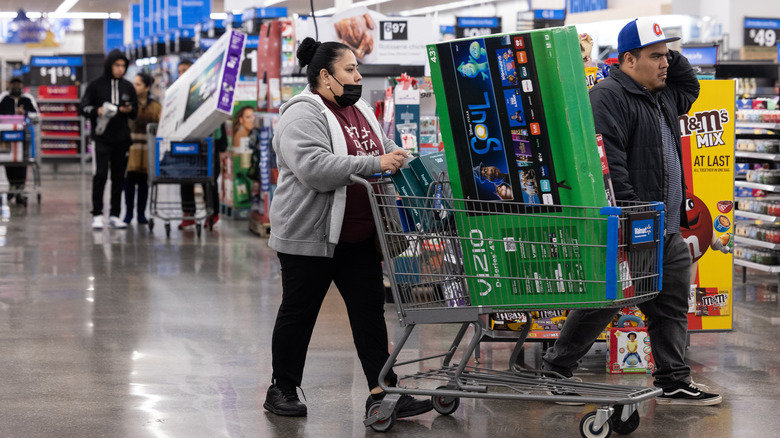Can 'Grocery Store' And 'Supermarket' Be Used Interchangeably?
When shopping for groceries, you're most likely focused on selecting the items you need to maintain your household. You might not be thinking about whether you're shopping in a grocery store or a supermarket, or you may even believe that there's no difference between the two.
What's not debatable is that grocery shopping these days is a far cry from the previous consumer experience. According to Legends of America, general stores began to spring up during the Colonial Era to accommodate people who lived far from urban centers. In addition to providing goods to shoppers, general stores also offered other services, such as banking and mail delivery.
While containing essential staples, these rustic establishments pale in comparison to modern shopping arenas. The Center for Science in the Public Interest describes the time and effort that goes into designing modern stores to encourage shoppers to spend as much money as possible. Then there are the high-tech gadgets like self-checkouts, which first came into usage in 1986 (per The Oklahoman). These advances and others like them have changed the way consumers shop, whether they're visiting a grocery store or the supermarket to fulfill their household needs.
It all comes down to the selection of products
As illustrated by Reader's Digest, there is a very sensible distinction between grocery stores and supermarkets. Grocery stores typically offer an assortment of food and drink, but little else. While you may find some additional items, such as over-the-counter medication and cleaning products, most of the inventory will be centered on consumables. On the other hand, a supermarket will stock a wide variety of goods in addition to food and beverages. This can include cookware, clothing, electronics, and many other consumer products. When you think of a supermarket, stores like Target and Walmart should come to mind. In fact, according to Supermarket News, Target is the sixth most shopped grocery store in the U.S.
While item availability is the primary difference between grocery stores and supermarkets, there's another variation to consider. In many cases, supermarkets are part of national or international chain stores, while many local grocery stores are owned by individuals within the community. This is not an exclusive distinction, as some regional grocery stores are also part of larger corporations.
Paving the way for America's first supermarket
Like most firsts, there is a bit of debate when it comes to who originated the supermarket concept in America. According to the King Kullen website, Michael J. Cullen's Long Island-based grocery stores were the first to bear the mantle in 1930. The website quotes the Smithsonian Institute as saying King Kullen stores were the first to meet "all five criteria that define the modern supermarket: separate departments; self-service; discount pricing; chain marketing; and volume dealing." The self-service aspect is in stark contrast to the previous shopping experience. Chron explains that in years past, shoppers would provide the grocer with a list of items, which would be selected by staff and given to the customer at checkout.
Of course, the invention of the supermarket was just one of many advances that would revolutionize the way consumers bought groceries and household goods. Just a few years after Cullen's supermarkets came onto the scene, Sylvan Goldman invented the very first rolling shopping cart in 1937, according to CBS News. And Smithsonian Magazine places the first appearance of barcodes on products in 1974. The brainchild of Joe Woodland, the inventor said he was inspired by Morse code and actually developed the first barcode design way back in 1949.


